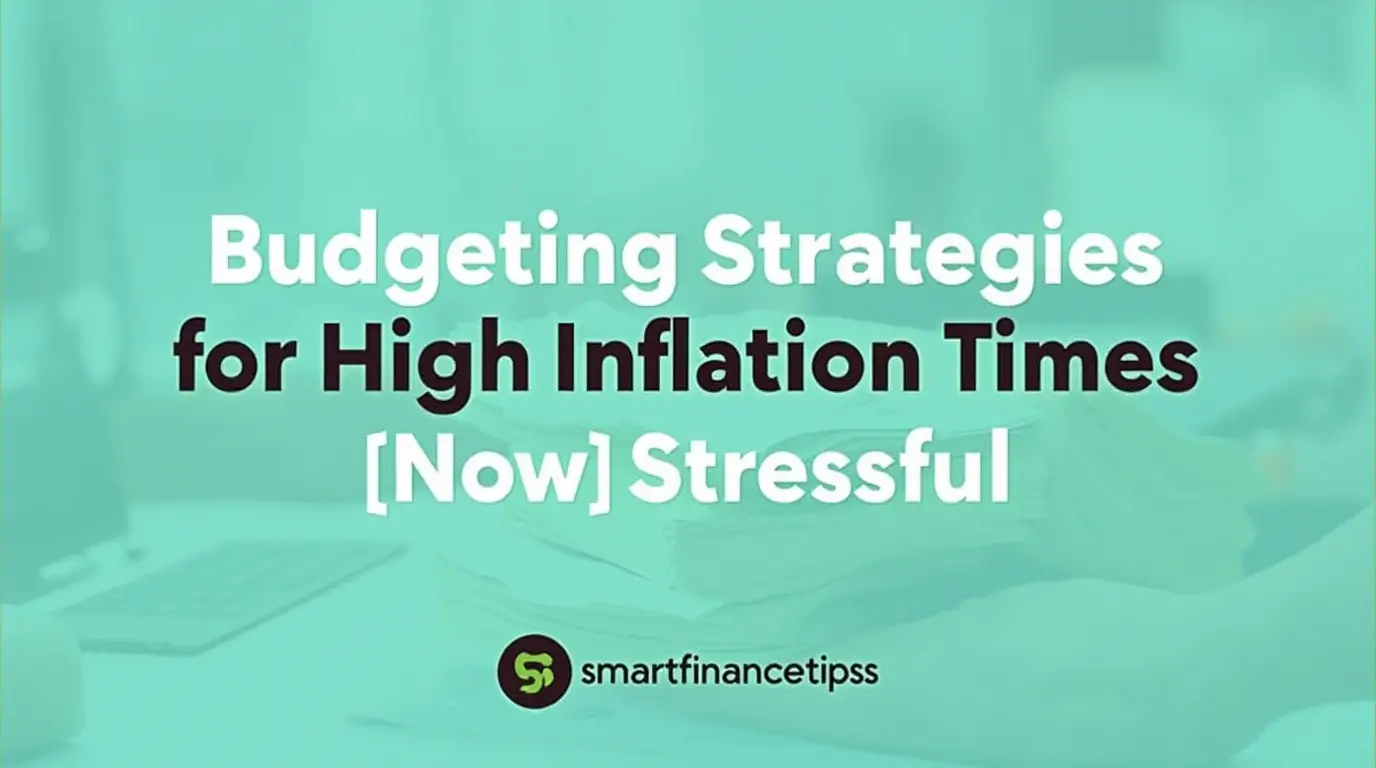The Best Fluffy Pancakes recipe you will fall in love with. Full of tips and tricks to help you make the best pancakes.
Table of Contents
Understanding Inflation: What It Means for Your Finances

Budgeting Strategies
Inflation is defined as the sustained increase in the price level of goods and services in an economy over a period of time. This phenomenon is typically measured by the Consumer Price Index (CPI), which tracks the changes in the cost of a basket of consumer goods. One of the primary effects of inflation is its impact on purchasing power; as prices rise, the same amount of money buys fewer goods and services. stocks to invest in now; Consequently, individuals may find their purchasing power diminishing, leading to increased financial strain, particularly in essential expenditures like food, housing, and transportation.
The implications of rising prices extend beyond mere daily purchases. Inflation can significantly affect savings and investments. For instance, if the rate of inflation surpasses the interest earned on savings accounts or investments, the real value of those savings erodes over time. Therefore, it becomes critical for individuals to consider inflation when planning their financial future, as stagnant savings can diminish one’s financial security over the long term.
Historically, inflation trends tend to fluctuate and can be influenced by various factors, including government policies, supply chain disruptions, and market demand. Understanding these trends helps individuals make informed decisions regarding their finances. For example, during periods of high inflation, it may be advantageous to invest in assets that typically keep pace with or outpace inflation, such as real estate or commodities. Furthermore, engaging in proper financial planning ensures that individuals can withstand the challenges posed by rising prices and adapt their strategies accordingly.
In a rapidly changing economic landscape, maintaining awareness of inflationary trends is essential for effectively managing one’s finances and mitigating its potential adverse effects. By understanding inflation and its implications, individuals can better navigate their financial landscape and implement strategies to safeguard their financial well-being.
Assessing Your Current Financial Situation
Understanding your current financial situation is crucial, especially during periods of high inflation. It provides a comprehensive view of your financial health, enabling informed budgeting decisions. Begin by evaluating your sources of income. This includes your primary salary, any secondary jobs, as well as passive income streams like dividends or rental income. Documenting these elements can help you gauge your total monthly income accurately.
Next, meticulously review your expenses. Categorize your expenditures into fixed and variable costs. Fixed costs may include rent or mortgage payments, insurance, and loans, while variable costs could encompass groceries, entertainment, and discretionary spending. Creating a detailed list of these expenses will allow you to identify potential areas for reduction and prioritize your spending effectively during inflationary times.
Another key component to assess is your current savings. Compare your savings goals against what you have already accumulated. Firm savings can act as a buffer against rising prices and unforeseen expenses. If you find that you do not have a sufficient emergency fund—ideally, three to six months’ worth of expenses—it may be time to adjust your budgeting approach to allocate more towards savings.
Finally, evaluate any outstanding debts. This involves calculating your total debt as well as understanding the interest rates associated with each. High-interest debts, such as credit card balances, can particularly strain your finances amidst high inflation, making it imperative to prioritize their repayment. By reviewing these four key areas—income, expenses, savings, and debts—you create a financial snapshot that reveals opportunities and challenges. This strategic evaluation will serve as the foundation for a more effective budgeting strategy, ensuring that you maintain control over your finances during fluctuating economic conditions.
Adjusting Your Budget: Prioritizing Essential Expenses

In times of high inflation, it becomes increasingly important to adjust your budgeting strategies by distinguishing between essential and non-essential expenses. This differentiation is crucial for managing one’s finances effectively, as inflated costs can severely impact an individual’s ability to meet basic needs. By focusing primarily on essential expenses, individuals can ensure their financial stability while navigating economic uncertainties.
Essential expenses typically include costs necessary for everyday living, such as housing, food, and transportation. Housing encompasses mortgage or rent payments, utility bills, and property taxes—making this category a top priority in any budgeting plan. Food expenses also warrant significant attention; planning and purchasing essential groceries rather than indulging in non-essential treats can greatly alleviate financial strain. Transportation, whether through public transport costs, fuel for a vehicle, or necessary car maintenance, should also be included as an essential expense. Allocating a substantial portion of a budget to these areas is vital, especially during inflationary times when prices may be on the rise.
When creating a budget amidst high inflation, it is advisable to categorize expenses into essentials and non-essentials. Essential expenses should be funded first, with any remaining budget allocated to non-essential items. For instance, while dining out or entertainment may provide momentary satisfaction, these categories should be deprioritized in favor of securing food, rent, and transportation. Furthermore, individuals may consider reducing non-essential expenses temporarily by evaluating subscription services, purchasing generic brands, or delaying large purchases until inflation stabilizes.
Overall, adopting a strategy that prioritizes essential expenses aids in maintaining financial security during periods of high inflation. By taking proactive steps to adjust budgets accordingly and making conscious spending decisions, individuals can better navigate their financial landscape amidst inevitable economic challenges.
Implementing Cost-Cutting Measures
During periods of high inflation, implementing effective cost-cutting measures is essential to maintain financial stability. One of the first steps individuals can take is to reduce discretionary spending. This involves evaluating and prioritizing expenses that are non-essential, such as dining out, entertainment, and subscription services. By cutting back on these expenditures, individuals can allocate more of their budget towards essential needs without sacrificing quality of life.
Another area where significant savings can be achieved is in utility bills. Strategies such as reducing energy consumption can lead to lower monthly charges. Simple actions like using energy-efficient appliances, unplugging devices when not in use, and using programmable thermostats can make a notable difference. By being more conscious of utility usage and adopting energy-saving habits, households can identify opportunities for significant savings that accumulate over time.
Negotiating bills with service providers is also a powerful cost-cutting technique. Contacting companies such as internet, cable, or insurance providers to discuss available discounts or better rates can lead to substantial reductions in recurring expenses. Many service providers are open to negotiation, especially when they recognize customers’ loyalty or if competing companies offer better deals. Taking the initiative to reassess these bills regularly can create a more manageable budget.
When it comes to shopping, employing a strategic approach can further enhance savings. Utilizing coupons, signing up for loyalty programs, and purchasing in bulk are effective methods to stretch finances. Coupons can often be found in newspapers or online, and loyalty programs frequently provide discounts or rewards for regular purchases. Bulk buying not only helps in saving money on individual units but also minimizes the frequency of shopping trips. These strategies collectively allow individuals to navigate high inflation by maximizing their purchasing power.
Building an Emergency Fund for Financial Security

In times of high inflation, having a robust emergency fund becomes essential for financial security. An emergency fund acts as a financial buffer, providing a safety net that can help manage unexpected expenses without derailing one’s budget. It is vital to build this fund before an emergency arises, as it allows individuals to respond swiftly to unforeseen circumstances such as job loss, medical emergencies, or necessary car repairs, which are particularly concerning during periods of inflation when costs tend to rise significantly.
The general rule of thumb is to save at least three to six months’ worth of living expenses in your emergency fund. This amount can vary depending on individual circumstances, such as job stability and personal financial obligations. To achieve this goal, it is crucial to prioritize saving. Start by assessing monthly expenses to determine how much needs to be set aside each month. Use budgeting tools or apps to track and manage spending effectively, identifying areas where cuts can be made or expenses can be reduced.
Moreover, consider setting up a separate, high-yield savings account specifically for the emergency fund. This approach not only helps to keep the funds distinct from regular spending but also allows for interest accrual, thereby enhancing the savings over time. Automating transfers into the emergency fund can streamline the savings process, making it easier to contribute consistently. By treating savings as a non-negotiable expense, individuals can gradually build their emergency funds, reinforcing their financial resilience against inflationary pressures.
Ultimately, having a well-funded emergency reserve can provide peace of mind, enabling one to navigate periods of financial uncertainty with greater confidence. In summary, the significance of cultivating an emergency fund during high inflation times cannot be overstated, as it ensures preparedness for whatever life may throw your way.
Investing Wisely: Protecting Your Wealth from Inflation
High inflation can erode purchasing power and diminish the value of savings, making it essential for individuals to adopt effective investment strategies to preserve their wealth. One fundamental approach is asset allocation, which involves diversifying investments across various asset classes to minimize risk and optimize returns. Rather than placing all funds in one category, investors should consider a mix of stocks, bonds, and alternative assets, adjusting their portfolio based on market conditions and personal risk tolerances.
For those looking to insulate their wealth from inflation, certain investment types have proven to be more resilient. Commodities, for example, often retain their value during periods of rising prices, as they are tied to tangible goods such as precious metals, oil, and agricultural products. These investments can serve as a hedge against inflation, providing an effective shield for one’s assets. In addition, real estate has historically been a strong inflation-resistant investment. Property values and rental income tend to increase with inflation, allowing real estate investors to maintain the value of their investments over time.
Moreover, it is crucial to seek guidance from a financial advisor when developing an investment strategy during high inflation periods. Financial professionals can provide tailored insights based on individual financial situations and market analysis, assisting investors in selecting the most appropriate inflation-resistant assets. Collaborating with an expert enhances the potential for successful wealth preservation, particularly in volatile economic climates.
In conclusion, investing wisely during times of high inflation requires a strategic approach that encompasses prudent asset allocation and a focus on inflation-resistant investments. Seeking advice from qualified financial advisors can further empower individuals to make informed decisions, ensuring that their wealth remains protected against the adverse effects of inflation.
Exploring Side Incomes: Boosting Your Financial Resilience

In times of high inflation, individuals often face increased financial pressure, making it imperative to explore supplemental income avenues. Engaging in various side jobs, freelancing, or establishing passive income streams can significantly enhance one’s financial resilience. This proactive approach allows individuals to diversify their income, alleviating the burden of rising living costs.
One of the most accessible options for supplemental income is freelancing. Platforms such as Upwork and Fiverr provide an excellent avenue for individuals to showcase their skills, whether in writing, graphic design, programming, or digital marketing. By setting a flexible schedule, freelancers can effectively manage their time and maintain work-life balance while generating additional revenue. Moreover, leveraging existing skills not only maximizes productivity but also enhances overall job satisfaction.
In addition to freelancing, exploring side jobs can be a viable option. Many people find part-time opportunities that complement their primary employment, such as tutoring, babysitting, or working in retail. These roles can be mixed into one’s schedule, allowing for the active generation of supplemental income without overwhelming other responsibilities. It is essential to choose positions that align with personal interests and availability, ensuring that the side job does not detract from overall well-being.
For those preferring a more passive income route, consider investing in stocks, rental properties, or creating digital products such as e-books or online courses. While these methods require initial investment of time or resources, they can yield ongoing financial returns with minimal ongoing effort. Establishing passive income sources contributes significantly to financial resilience during inflationary periods.
Ultimately, managing a side income while retaining a healthy work-life balance demands careful planning and consideration. With dedication and strategic thinking, individuals can effectively boost their income, potentially securing a more stable financial future in uncertain economic climates.
Regularly Reviewing and Adjusting Your Budget
In times of high inflation, one of the most crucial aspects of sound financial management is the regular review and adjustment of your budget. Inflation can significantly impact the cost of living, and as prices fluctuate, it becomes vital to frequently assess your financial situation. By committing to a monthly or quarterly review process, individuals can ensure that their budgets remain relevant and effective in meeting their needs.
Begin by analyzing your spending patterns and income sources. Look for any areas where expenses have increased due to inflationary trends. For instance, if gas prices have surged or food costs have risen steeply, it may be necessary to allocate more funds to these categories. This assessment not only informs you of necessary adjustments but also helps identify any discretionary spending that can be reduced or eliminated altogether to accommodate rising costs.
Furthermore, monitoring your financial goals during these revisions is essential. Whether saving for a long-term investment or preparing for unexpected expenses, keeping these objectives in mind will help you prioritize areas of your budget that need adjustments. Additionally, if you find that your overall income has changed, whether through salary adjustments or shifts in employment, your budget will require reallocation to ensure its effectiveness amidst economic fluctuations.
Finally, take advantage of budgeting tools and resources available online. These tools can assist you in setting realistic financial targets based on updated economic conditions. By integrating technology, you can quickly analyze your spending and identify necessary adjustments. Regularly reviewing and adjusting your budget will provide you with a clearer picture of your financial health and help navigate the challenges posed by high inflation. This proactive approach will increase your resilience to economic changes and assist in achieving financial stability.
Seeking Professional Financial Guidance

In times of high inflation, navigating personal finances can become increasingly challenging. As the cost of living rises, individuals may find it beneficial to seek the expertise of financial professionals who can offer personalized budgeting strategies tailored to their unique financial situations. Working with a qualified financial advisor can provide a multifaceted approach to budgeting that accounts for fluctuations in inflation and prepares for future economic uncertainties.
When considering a financial advisor, it is essential to evaluate their qualifications and experience. Look for certifications such as Certified Financial Planner (CFP) or Chartered Financial Analyst (CFA), which indicate that the advisor has undergone rigorous training and adheres to ethical standards. Additionally, consider their experience in managing budgets during periods of inflation. A well-rounded advisor will not only understand market dynamics but also possess practical insights that can help clients navigate inflationary pressures effectively.
One of the primary benefits of seeking professional financial guidance lies in the creation of a tailored budget plan that incorporates various economic scenarios. Advisors can help clients prioritize expenses, identify areas for potential savings, and suggest investment avenues that may protect against inflation. Furthermore, financial guidance can empower individuals to build a robust financial foundation, ensuring that they maintain stability even when external factors, such as inflation, create upheaval.
Moreover, regular consultations with a financial advisor can provide ongoing support and adjustments to the budget as circumstances change. This dynamic approach to financial management can help clients remain agile in their financial strategies, making it easier to adapt to unexpected shifts in the economy. Overall, partnering with a financial professional can be a prudent step towards achieving greater financial stability in an inflationary environment.
Did You Like Our Article
i like this poste you help me
. We encourage readers to take actionable steps towards establishing their emergency fund, making a commitment to their financial future. Doing so is not just a precaution; it is a proactive strategy that lays the groundwork for a secure and stress-free financial life.
ai monetization artificial intelligence behavioral economics blogging guide bubble cryptocurrency budgeting strategies budget management business business days business license business plan business plans cryptocurrency creation debt management debt strategies decentralized finance earn money finance development financial app financial planning fintech services freelance business freelancing business home earnings investment methods investment stocks invest stocks marketing services money blogging money management money online personal budget personal budgeting personal data personal finance real estate remote work side business small business start start business stock investment stock market stock trading successful businesses
Budgeting Strategies for High Inflation Times1 now Stressful
Inflation is defined as the sustained increase in the price level of goods and services in an economy over a period of time. This phenomenon is typically measured by the Consumer Price Index (CPI), which tracks the changes in the cost of a basket of consumer goods. One of the primary effects of inflation is its impact on purchasing power; as prices rise, the same amount of money buys fewer goods and services. stocks to invest in now; Consequently, individuals may find their purchasing power diminishing, leading to increased financial strain, particularly in essential expenditures like food, housing, and transportation.









